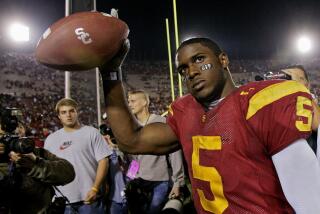Nebraska’s Frazier Finds His Priorities
LINCOLN, Neb. — As fall turned to winter last year and the color and warmth left the Nebraska plains, Tommie Frazier wondered what he was doing there, so far away from his Florida home. Blood clots in his right leg kept the Cornhuskers’ starting quarterback out of eight games and threatened his career. So without the football, what good was a football scholarship?
“When you’ve been playing something for 14 years and all of a sudden it’s taken away from you, that’s a hard thing for a guy my age to go through,” Frazier said. “I felt that there was no reason for me to stay up in school since I can’t play football. My mom sat down and had a long talk with me and told me, ‘You can’t depend on football the rest of your life. Whatever happens, you’re not going to be playing football forever. If you stay up here and get your degree, you can always depend on that after you get it.’ ”
Heading into winter 1995, Frazier is on his way to getting that degree. But he also is figuring to play an important postseason role for Nebraska.
That’s the way it was when he was a freshman, starting in the Orange Bowl. That’s the way it was in the Orange Bowl his sophomore season, when he almost pushed the Cornhuskers past prohibitive favorite Florida State, with only a missed last-second field-goal attempt keeping them from the national championship. And that’s the way it was in the 1995 Orange Bowl, when Frazier returned to action for the first time in 15 weeks and led the Cornhuskers over Miami for the school’s first national championship since 1971.
This year the venue is the Fiesta Bowl, where the top-ranked Cornhuskers will play No. 2 Florida on Tuesday. Frazier remains a constant, the heart of Nebraska’s offense.
“I think he’s been on an even keel since the day he stepped out on the field,” Nebraska senior center Aaron Graham said. “He’s maybe gained more experience, but as far as his talent, his attitude, he’s been a tough competitor since the first day I met him. Four years later, he’s still playing tough.”
His toughness is the one attribute to which everyone refers. Nebraska estimates 319 of his 604 rushing yards came after contact. One play that seemed to summarize his resolve came at Colorado this season, when Frazier was in the grasp of a defender, his legs immobilized, yet managed to throw the ball to Ahman Green near the sideline. It was typical Frazier: a stellar effort, but not the type to earn a spot in the evening’s television highlights.
Despite all of this tough stuff, he still is a kid who yields to his mother. And it was a conversation with Priscilla Frazier that kept him going. Well, not really a conversation.
“He listened and I talked,” Priscilla Frazier said.
It came in October 1994, when Frazier was preparing to have surgery to tie a vein in his right leg, and his mind filled with doubts about his ability to play football again. His mother flew here from their home in Bradenton, Fla., to be by his side and terminate any thoughts he might have about leaving.
“You will not come home, you will not quit school,” she told him. “No ands, ifs or buts.”
Frazier stuck around, his leg improved and Nebraska Coach Tom Osborne created a bit of a stir by naming him the starter for the Orange Bowl.
With Frazier starting, the Cornhuskers are 32-3. This season, he had only 1,362 passing yards, but in the Heisman Trophy race, he still finished ahead of Florida quarterback Danny Wuerffel and his 3,266 passing yards, finishing second to Ohio State running back Eddie George. The votes for Frazier (and 218 ballots had him listed first) were clearly votes for his leadership and value to the team.
“He’s done a tremendous job for us,” Osborne said. “There are very few players in college football that have to do as many things as he has to do: run the option, throw the ball, make good decisions. We do a lot of checking at the line of scrimmage, so intellectually he has to be very acute. He does a good job.”
Whether Frazier’s skills will translate into a job as an NFL quarterback remains to be seen. The NFL traditionally has frowned on option quarterbacks, and some black college and NFL players have complained that blacks are not given equal opportunity at quarterback. Even gifted Charlie Ward of Florida State did not get drafted in 1994.
“I don’t know if I’m going to go or not,” said Frazier, who won the Johnny Unitas Award as the nation’s top senior quarterback. “I hope my chances are good, but I don’t know about that. Whatever they ask me to do, I’ll sit down and think about it. If that’s what I want to do, I’ll give it my best.”
More to Read
Go beyond the scoreboard
Get the latest on L.A.'s teams in the daily Sports Report newsletter.
You may occasionally receive promotional content from the Los Angeles Times.










